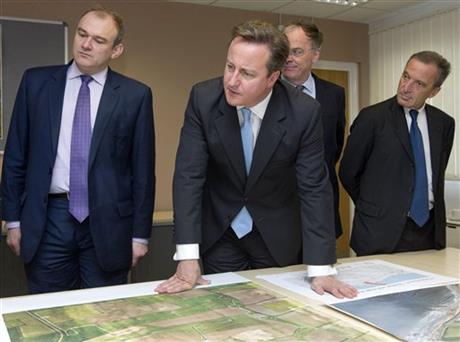
By DANICA KIRKA
From left: Britain’s Energy Secretary, Ed Davey, Britian’s Prime Minister David Cameron, Vincent de Rivaz, Chief Executive of EDF (Electricite de France) and Henri Proglio, CEO and Chairman of EDF examine site plans for the new Hinkley C nuclear power station at Hinkley Point, south western England, Monday, Oct. 21, 2013. Britain’s first new nuclear power station in a generation is to be built under the 16 billion pound ($26 billion/19 billion euro) project which will create thousands of new jobs. The move followed an agreement between the Government and French-owned EDF Energy, which will see Hinkley Point C begin operating in 2023. (AP Photo/PA, Justin Tallis) UNITED KINGDOM OUT NO SALES NO ARCHIVE
LONDON (AP) — Britain has struck an agreement to build a new nuclear power plant — the first such deal in the European Union since the disaster at Fukushima prompted a major rethink of the energy source’s merits.
The contract underscores how few options major European economies have if they want to keep households’ energy costs from spiking.
The 16-billion pound ($25.9 billion) project, which was agreed on Monday with France’s EDF energy and a group of Chinese investors, aims to keep the lights on in Britain amid declining supplies of North Sea gas and rapidly escalating fuel costs.
“If people at home want to be able to keep watching the television, be able to turn the kettle on, and benefit from electricity, we have got to make these investments,” Energy Secretary Ed Davey told the BBC. “It is essential to keep the lights on and to power British business.”
GERMAN EXAMPLE
Germany led the charge against nuclear energy two years ago following the shock of the meltdown at Fukushima, Japan in 2011. The government decided to shut down all of the country’s nuclear power plants by 2022 and to make up for the output gap with renewable energy.
But the effort is proving to be costlier than expected for taxpayers.
Not only do many new wind, solar, water and biomass plants need to be built, but Germany’s energy grid has to be overhauled to balance the fluctuating supply such power sources provide. Consumers are also footing the bill for state subsidies that are granted to renewable energy producers and meant to encourage the sector’s growth.
UNCERTAIN COST BENEFITS
The deal in Britain, the first of its kind in a generation, shows Germany’s example is not winning over many emulators just yet.
The new reactor — which will be built at Hinkley Point in southwest England and will start working in 2023, subject upon EU approval — will guarantee power.
However, while it will help keep the country’s carbon footprint from increasing, it may not keep electricity prices down.
Under the terms of the deal, the British government has promised to pay the investors who will build the reactor a price of electricity for 35 years of as much as 92.5 pounds per megawatt hour, plus inflationary increases.
Experts like said Antony Froggatt, a senior research fellow at Chatham House, say that’s double the current market rate — and more than that produced by gas and coal fired power stations.
CHINA’S RISE
The deal is a boon to China, which relies on foreign technology for its generating stations and is developing its own reactors.
“(China) is wishing to become a global leader within the nuclear sector,” Froggatt said.
China General Nuclear Corp. and China National Nuclear Corp. are majority-owned by the government in Beijing. They will provide 30 percent to 40 percent of the money to build the reactor. The technical expertise will mainly come from French companies, in particular EDF, which is controlled by the French government and will provide 45 percent to 50 percent of financing.
But Chinese engineers will gain experience and learn about navigating a complex licensing process.
The ability to partner with existing players will also help China gain a foothold in foreign markets — a showcase opportunity to eventually export its own work.
“That opens doors,” Froggatt said.
___
Frank Jordans contributed to this report.



